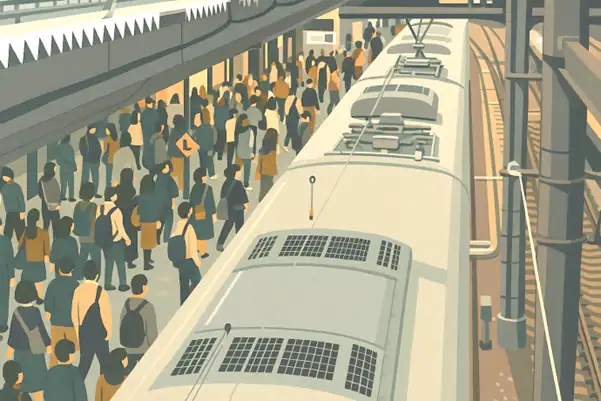With remote work more common than ever, many people are thinking about relocating to the countryside. Still, it’s natural to wonder whether rural life will truly suit one’s needs.
In this article, we’ll take a closer look at the pros and cons of moving to rural areas. We’ll be looking into key areas related to work, lifestyle, and finances while highlighting important points to consider before making the move. We hope this serves as a helpful starting point for those who are thinking about a change of scenery.
Village House offers rental properties across Japan, starting at just ¥20,000. If you’re looking for a new place to live, make sure to check out our website.
Pros and cons of moving to the countryside | Work

Advantage 1: No more rush hour commutes
In rural areas, public transportation isn’t as crowded in the city. So, it is uncommon to find packed trains or heavy traffic. You’ll likely find yourself feeling more relaxed and mentally refreshed with less stress and fatigue from commuting.
Advantage 2: Easier to start a business
Less competition in rural areas can make it easier for you to start your own business. Startup costs such as rent, property, and labor also tend to be much lower than in cities. It can be a more accessible environment to get things off the ground for first-time entrepreneurs.
Disadvantage 1: Lower salaries
Wages in rural areas are usually lower than in urban areas. There is a high chance that you will earn less than you would in the city for the same role. Career advancement and salary growth can also be slower at local companies. So if a high income is a priority for you, this is something to consider seriously.
Disadvantage 2: Limited job options
Job opportunities can be fewer and more limited in scope in rural areas. Therefore, it might be a little difficult to find a role that fits your experience or salary expectations. Be sure to research the local job market thoroughly before making the move.
Pros and cons of moving to the countryside | Lifestyle

Advantage 1: Lower prices
Things like groceries and everyday essentials usually cost less in the countryside than in the city. Plus, you can enjoy fresh, local ingredients that you might not find anywhere else. It’s an easy way to eat well without spending a lot.
Advantage 2: Abundant nature
The countryside offers easy access to nature, including mountains, rivers, and the sea. If you’re craving a quieter lifestyle and a stronger connection to nature, rural life will have a lot to offer you.
Advantage 3: Less stress caused by crowds
As there are fewer people around, shops and restaurants are usually less crowded. This means you’re not stuck waiting all the time, and life tends to move at a slower, more laid-back pace. Since there aren’t as many cars, getting around is way less stressful than in the city.
Disadvantage 1: Life without a car can be tough
In many rural areas, public transportation is limited. Therefore, having a car is often a must. However, owning a car comes with extra costs such as gas, insurance, parking, and maintenance. As transportation can become a major obstacle if you don’t have a license, please make sure to check the necessity of a car before making the move.
Disadvantage 2: Fewer supermarkets and convenience stores
In more remote areas, you might find fewer supermarkets, convenience stores, and other shops nearby. In cities, you can walk to most of these places. However, in rural areas, you may need to drive to do your shopping. Also, the variety of products and stores may be limited. Therefore, you might need to be prepared for fewer choices.
Pros and cons of moving to the countryside | Finances

Advantage 1: Cheap and delicious ingredients
In areas rich in nature, fresh vegetables, fruits, and local seafood are often available at reasonable prices, making food satisfaction high. You can also easily start a home garden so that you can save on food costs.
Advantage 2: Reduced living expenses
One of the advantages of moving to rural areas is that the cost of living can be reduced. Prices are generally cheaper in rural areas than in cities, so costs for housing, food, and utility bills are reduced.
Disadvantage 1: High public transportation fares
There are fewer trains and buses in sparsely populated areas. Transportation fares tend to be expensive in these areas. In addition, because there are limited means of transportation, you may find daily transportation inconvenient. There can be situations where it is difficult to live without a car, so it is important to do some research in advance.
Disadvantage 2: Car maintenance costs
In areas with few public transportation facilities, a car is often essential as a means of transportation, and maintenance costs such as gasoline, parking fees, vehicle inspections, and optional insurance are also required. While the cost of living will be cheaper than in urban areas, car-related expenses are likely to increase.
Things to check before moving to the countryside

About the climate and disasters in the area you want to move to
When considering moving to the countryside, research the climate and disaster risks of the area you are moving to in advance. Some areas are prone to heavy snowfall, typhoons, and earthquakes, so it is important to check whether these will affect your daily life.
About public transportation
In many rural areas, public transportation is not well developed once you are away from the center, and a car is essential for daily travel. Make sure to check in advance the number of buses and trains running in the area, whether there are routes, and transportation costs if you do not plan to have a car.
About rent and parking
There is an impression that the rent is cheaper in rural areas. But even in rural areas, costs can be high if you live in a prefectural capital or the center. In areas where you need a car, you may need to pay for parking separately, so be sure to check the housing costs of the area you are moving to in advance.
About government subsidies related to moving to the countryside

There are various subsidy systems available from the national and local governments for people moving to rural areas. The “Relocation Support Grant” provides up to ¥600,000 for singles and ¥1 million for households who have lived (or commuted) to Tokyo’s 23 wards and move to rural areas and meet the conditions of employment, starting a business, teleworking, etc. If there are accompanying children, an additional ¥1 million will be provided for each child.
In addition, the “Startup Support Grant” provides support of up to ¥2 million for people who start businesses aimed at solving social issues in rural areas. It can be used in combination with the Relocation Support Grant. When considering moving to rural areas, research the various support systems and make good use of them.
Source: Cabinet Secretariat and Cabinet Office General Website Regional Revitalization
At Village House, deposit, key money, commission, and renewal fees are free (*). If you are moving to a rural area and want to save on initial costs, please feel free to contact us.
*A deposit may be required depending on the contract contents and screening results.
Related articles:

Hello, I’m Machiko Doi, a freelance writer who writes about housing and living in Japan.
I live in an 80-year-old house that I inherited from my grandparents along with my two shelter cats and daughter.
We live a relaxed life while repairing the house.
I like to cook vegetables from the garden and fresh fish caught by my father, and enjoy them with cold beer on a hot day or hot sake on a cold day.



